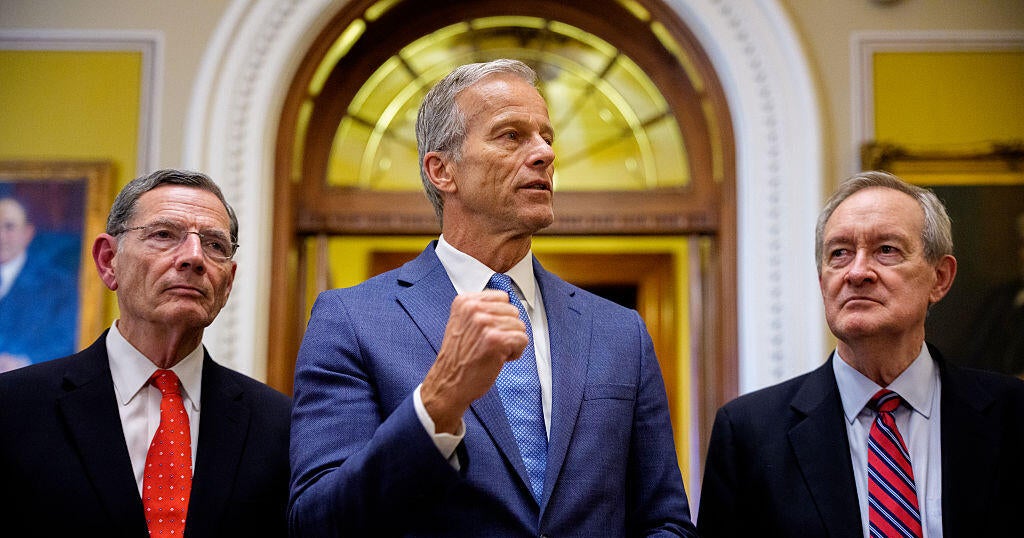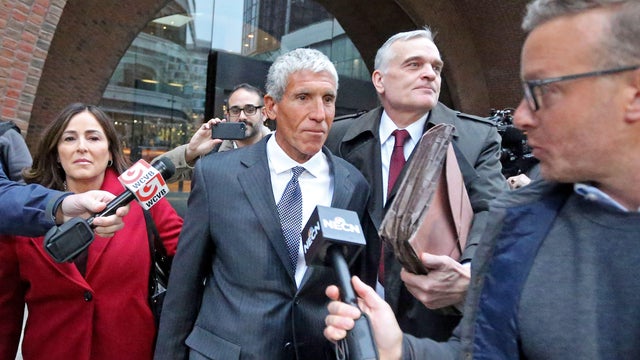

No response returned

Washington — The Senate could move forward as soon as Tuesday on a request from the White House to claw back billions in funds for international aid and public broadcasting as Congress faces a Friday deadline to act.
In what's known as a rescissions package, the White House in June that Congress cancel $9.4 billion in funding that had previously been approved for spending, starting the clock on a process that gives lawmakers 45 days to act. If both chambers don't approve an identical package before the deadline, the funding will be spent as planned.
The legislation seeks to make permanent some of the Department of Government Efficiency's spending cuts, with the primary focus being slashing foreign aid. But it would also effectively cut off federal funding for NPR and PBS.
Senate Majority Leader John Thune, a South Dakota Republican, said he hoped to hold the first procedural votes Tuesday, but still appeared uncertain in the afternoon if he had the votes to advance it.
Office of Management and Budget Director Russell Vought met with Senate Republicans as some members remained resistant to pulling back all of the funding. Vought left the meeting saying there would be a substitute amendment that would eliminate the cuts to an AIDS prevention program.
"There is a substitute amendment that does not include the PEPFAR rescission and we're fine with that," Vought told reporters, referring to the President's Emergency Plan for AIDS Relief.
Vought said the package would total $9 billion with the change and is "substantially the same package."
"We hope that if we can get this across the finish line in the Senate, that the House would accept that one small modification," Thune said.
Last month, the the White House's original request, overcoming opposition from all Democrats and four Republicans.
The rescissions request would cut $8.3 billion for the United States Agency for International Development, or USAID, along with other international assistance programs — from peacekeeping efforts to refugee assistance and climate projects. Also included in the package is a proposed $1.1 billion in cuts for the Corporation for Public Broadcasting, the private nonprofit that serves as the steward of the funding to NPR and PBS. The White House has targeted the entities, claiming they have "spread radical, woke propaganda disguised as 'news.'"
But some Senate Republicans have opposed components of the package, like cuts to a program aimed at combating HIV and AIDS globally.
Started by former President George W. Bush, PEPFAR has been credited for saving millions of lives around the world. Sen. Susan Collins, a Maine Republican, told reporters last week that she wants to strike the PEPFAR rescissions, saying, "I can't imagine why we would want to terminate that program."
Collins, the chair of the Senate Appropriations Committee, pushed back when Vought testified to the panel in June that "no lifesaving treatment will be impacted by this rescissions package" and that "anyone currently receiving lifesaving treatment will continue to receive that treatment."
"When you look at PEPFAR, you are eliminating a lot of the prevention programs," Collins said, also questioning whether the package would harm efforts to prevent the spread of tuberculosis, polio and malaria and what effects it would have on maternal and child health programs that help feed malnourished children. "Those are all programs that have been proven effective."
"These are not only the right thing to do for humanitarian reasons, but they're incredible instruments of soft power," Collins said.
Collins on Tuesday said the PEPFAR changes announced by Vought were "progress," but called for more specifics on other cuts.
Others have raised concerns about , especially in rural areas where they take on added significance as a means of communicating emergency messages.
One of the Republican members who had concerns, Sen. Mike Rounds of South Dakota, said Tuesday he would back the bill after working with the Trump administration to find alternate funding.
"We wanted to make sure tribal broadcast services in South Dakota continued to operate which provide potentially lifesaving emergency alerts," . "We worked with the Trump administration to find Green New Deal money that could be reallocated to continue grants to tribal radio stations without interruption."
Amending the package will mean the House will have to sign off on the changes. And with the Friday deadline, time is running out to do so before the request expires. House Speaker Mike Johnson, a Louisiana Republican, said Monday he hoped the Senate sticks with the House-approved package.
"I think you've got to respect the White House's request, and that's what we did," Johnson said.
In the Senate, rescissions bills are not subject to the 60-vote threshold needed to advance most legislation, requiring only a simple majority. But with just 53 Republicans, Senate GOP leaders can only afford to lose a handful of their members to approve the package.
President Trump weighed in on the rescissions push late last week, saying in a on Truth Social that it's "very important that all Republicans adhere to my Recissions Bill," citing the public broadcasting cuts in particular. The president warned that any Republican who doesn't support the clawback in funding "will not have my support or Endorsement."
Meanwhile, the rescissions push has sparked frustration among Democrats, who have little ability to stand in its way. But an upcoming spending fight is another story. Democrats have begun suggesting that the GOP effort to claw back already approved congressional funds could have an impact on their willingness to work across the aisle on government funding down the road.
Each year, Congress approves funding to keep the federal government running before the funds are disbursed to government agencies and programs. The rescissions process allows Congress to cancel funds that the federal government has not yet spent.
Senate Minority Leader Chuck Schumer warned about the upcoming rescissions push in a letter to his colleagues upon the return from the Fourth of July recess, arguing that the package's passage "would be an affront to the bipartisan appropriations process." The New York Democrat called it "absurd" for the GOP to expect Democrats to engage in a bipartisan appropriations process that could be undermined by rescissions.
"Republicans are, in effect, proposing Congress negotiate bipartisan deals in the Committee room, while they retreat to a backroom to rubberstamp President Trump's purely partisan scheme that only needs a simple majority to pass to tear up those very same agreements," Schumer wrote.
In response, Thune said on the Senate floor last week that he was "disappointed" to see Schumer "implicitly threaten to shut down the government," while adding that he's "hopeful that that is not the position" of Senate Democrats.
When asked by reporters about the possibility of a shutdown, Schumer said, "Ask the Republicans why they are heading on this path."
"We are doing everything we can to keep the bipartisan appropriations process going, and they're undermining it with rescissions," Schumer added.





